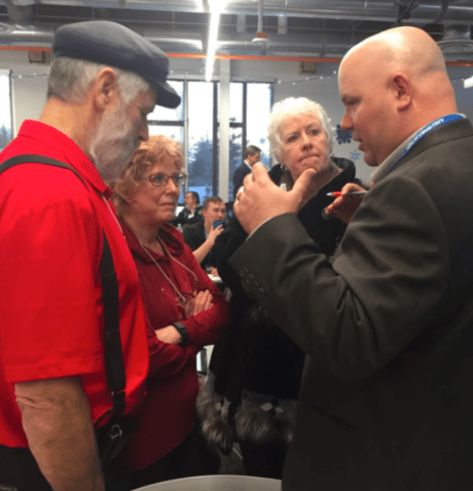DOT TO ADVANCE ON SIGN WAR, WITH CROWBARS?
What do you do when you’re the sitting governor and you’re losing the “sign war” for your reelection? You have your Department of Transportation enforce the “no signs visible from roadway” law.
In advance of a crackdown from the Alaska Department of Transportation, Gov. Bill Walker’s campaign has started removing its own Walker/Mallott signs from roadways.
Photographed above, Walker’s sign had been stripped from its wooden frame, which was a still standing at the corner of Jewell Lake Road and Raspberry Road in Anchorage on Wednesday. Empty Walker frames are also found elsewhere in Anchorage, notably at the A and C Street triangle near 39th.
The State has hired three part-time workers to remove signs that are in the State’s rights-of-way.
A notice went out to candidates on July 9 that the enforcement of the sign law would start.
Four days earlier on July 5, Gov. Walker purchased $19,000 worth of bus wrap signs in Anchorage, according to his financial reports with the Alaska Public Offices Commission.

“Does DOT feel they have the roads in such good repair that they can use their limited resources for harassment of candidates?” asked one political campaign worker, who asked to remain anonymous.
At this point in the campaigns, there are literally thousands of candidate signs up across the state. Three part-time workers will have their work cut out for them, as they pry and haul the signs back to a DOT storage yard and then fine the candidates $50 per confiscated sign.
How DOT temporary employees will make the decisions on which signs to target during the last three weeks of the Primary election is delicate. Taking down the wrong sign may attract a First Amendment lawsuit from a candidate, especially if an opposing candidate’s sign is left standing in an equivalent place.
The entire endeavor is lawsuit bait. Documentation of sign removal will need to be impeccable in advance of legal action that could plausibly allege the Walker Administration is willfully trying to swing the election.
All signs in the state right-of-way are illegal, but the law that governs this is not enforced historically for campaigns, or even for garage sale or real estate signs. Signs are often found within sight of state roads — even if they are on private property.
The law is problematic, but resulted from a voter initiative in 1998 to ban billboards.
A State DOT representative said anything that blocks the line of sight and creates a safety hazard will be targeted first. That might be a judgment call, but Walker’s sign on Raspberry and Jewell would not have been in that category. It was among several at that intersection, with others possibly creating a sight-line hazard.
In the past, the law is something the State has ignored because the First Amendment is unambiguous in its protection of political speech. All it usually does is send out a notice to candidates about the law, which can be seen here.
Tuckerman Babcock, chairman of the Alaska Republican Party, recalled how in 1994, the state Department of Transportation picked up all of Sen. Lyda Green’s signs in Wasilla, while leaving Jay Kerttula’s sign untouched.
“They wanted me to pay to pick up my signs, and I said, ‘You give me all the signs, and I’m not going to pay for them, and I’m not going to complain to the media that you are a political arm of the Democratic Party.’ They gave me the signs back,” he said.
“I think they have to be mindful of public safety, but they don’t want to be caught taking sides,” Babcock said.












